
In a bold strategic move, Labour leader Sir Keir Starmer has orchestrated a significant reshuffle of his top team, positioning the party for what many believe could be an imminent general election.
Rayner's Expanded Portfolio
Deputy leader Angela Rayner emerges as a major winner in this restructuring, taking on two crucial new shadow roles. She will now shadow both the Levelling Up department and the Cabinet Office, giving her substantial influence over Labour's domestic policy agenda.
This enhanced position solidifies Rayner's status as one of the party's most powerful figures, with insiders suggesting this move strengthens Labour's commitment to addressing regional inequality and government accountability.
Strategic Appointments
The reshuffle sees several key promotions that signal Starmer's priorities. Pat McFadden, a trusted Starmer ally, assumes the critical role of National Campaign Coordinator, putting him in charge of Labour's election machinery.
Meanwhile, Liz Kendall takes on the Work and Pensions brief, while Shabana Mahmood steps up as the new Labour Party Chair – positions that will be vital in crafting the party's message to voters.
Election Readiness
This comprehensive reshuffle comes amid growing speculation that Prime Minister Rishi Sunak may call a spring election. Labour sources indicate the changes are designed to create a "battle-ready" team capable of taking on the Conservatives.
The timing appears strategic, with Starmer seeking to present a united, competent front before what could be a bitterly contested election campaign.
Farage Factor
Interestingly, the reshuffle also accounts for the potential return of Nigel Farage to frontline politics. While not standing as an MP himself, Farage's influence on the political right and his ability to mobilise voters remains a concern for both major parties.
Labour's repositioning includes strengthening its appeal to traditional working-class voters who have been attracted to Farage's messaging in recent elections.
Looking Ahead
This reshuffle represents Starmer's most significant organisational change since becoming leader. By promoting trusted allies and creating a more streamlined shadow cabinet, he aims to present Labour as a government-in-waiting, ready to take office should the opportunity arise.
With the political landscape increasingly volatile and election rumours intensifying, these changes may prove crucial in determining whether Labour can convert its consistent poll lead into parliamentary majority.





